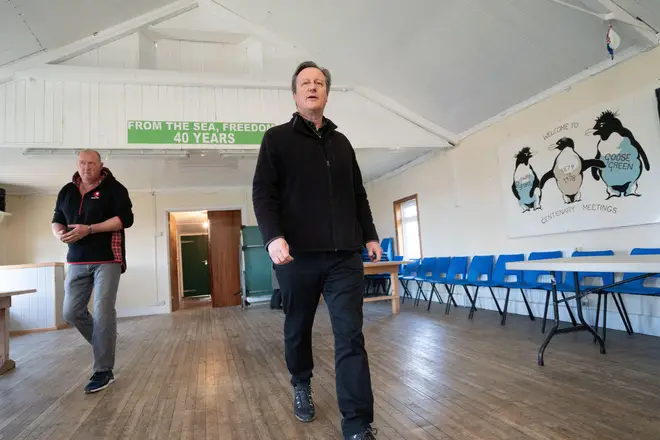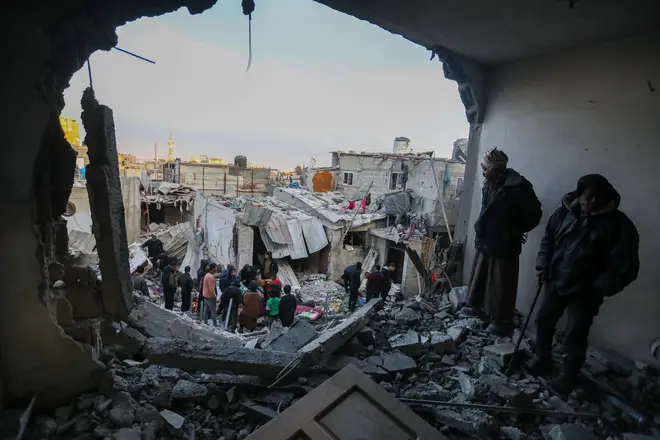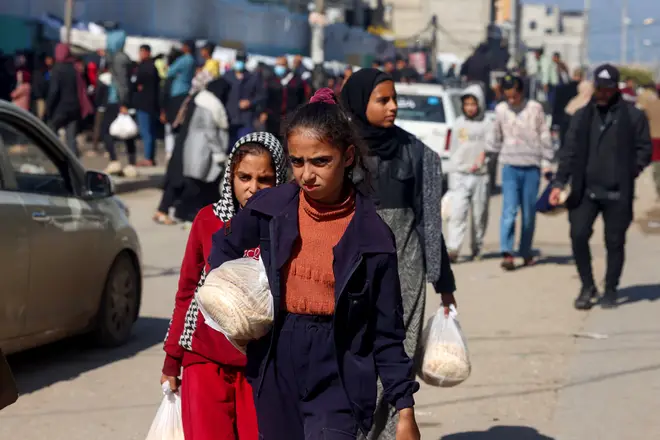
Nick Abbot 10pm - 1am
20 February 2024, 06:52

David Cameron has urged Israel to "stop the fighting" rather than launch a ground offensive on Rafah to retrieve the remaining Hamas hostages.
Israel has threatened to send troops into the southern Gaza city on March 10, despite the local population being hugely swelled by refugees from the rest of the territory.
Foreign Secretary Lord Cameron joined the US in calling on Israel to pause amid fears for the civilian population. Casualties in Gaza reached 29,000 on Tuesday, the Hamas-linked health service said.
Speaking to reporters on a visit to Stanley in the Falkland Islands, Lord Cameron said: "We are calling for a stop to the fighting right now, we think that what we need is a pause in the fighting and the hostages to come out and aid to go in. That should happen straight away.

"Then what we need to do is turn that pause into a permanent, sustainable ceasefire.
"Lots of things will have to happen in order for that to be the case and for fighting not to resume. We are going to have to see Hamas leaders leave Gaza, we are going to have to see the machinery of terrorism taken down, we are going to have to see a proper horizon for the Palestinian people, a new Palestinian government.
"But let's make that happen, let's have the stop to the fighting now, have that hostage release and then build on it from here. That's what we need to happen rather than an offensive in Rafah."
Meanwhile the US, Israel's most important ally, said that the ground offensive in Rafah "should not proceed in current circumstances".
Joe Biden wants the UN to vote on a "temporary ceasefire", with the US twice having vetoed a ceasefire resolution.

It comes after Israeli war minister Benny Gantz said: "The world must know, and Hamas leaders must know - if by Ramadan our hostages are not home, the fighting will continue everywhere, to include the Rafah area".
He added that the IDF would fight in "a co-ordinated manner, facilitating the evacuation of civilians in dialogue with our American and Egyptian partners to minimise civilian casualties".
Ramadan begins on March 10 this year. Mr Gantz's comments marked the first time Israel had commented on when its troops would enter Rafah.
Israel has consistently sought to move Palestinians into Rafah, and an estimated two-thirds of the territory's population are thought to be living there.

The army's plans to enter Rafah have previously sparked international concern about civilian deaths.
UN Secretary-General Antonio Guterres said earlier in February that "such an action would exponentially increase what is already a humanitarian nightmare with untold regional consequences."
Israel has been bombarding Rafah with airstrikes even before the ground offensive, with images showing scenes of destruction in the city.
It is unclear what civilian evacuation plan Mr Gantz was referring to, but it may be that Israel expects Egypt to take refugees via the Rafah crossing, which Egypt has previously been reluctant to do.

“They are not dragging it out for political purposes, they’re executing war for policy purposes" says former senior advisor to the U.S Ambassador to Israel Aryeh Lightstone
Mr Biden has tried to stop Israel from moving into Rafah without a "credible and executable" plan to protect the lives of civilians.
Lord Cameron said earlier this month that the UK was "very concerned about what is happening in Rafah because, let's be clear, the people there, many of whom have moved four, five, six times before getting there."
He added: "It really, we think, is impossible to see how you can fight a war amongst these people, there is nowhere for them to go.
"They can't go south into Egypt, they can't go north and back to their homes because many have been destroyed."
"So we are very concerned about the situation and we want Israel to stop and think seriously before it takes any further action," he added.

Cameron says Israel should stop and think seriously before Rafah offensive
"But above all, what we want is an immediate pause in the fighting. We want that pause to lead to a ceasefire, a sustainable ceasefire without a return to further fighting. That is what should happen now.
"We need to get those hostages out, including the British nationals. We need to get the aid in. The best way to do that is to stop the fighting now and turn that into a permanent, sustainable ceasefire."
Israel said on Sunday that it opposes other countries recognising a Palestinian state without direct negotiation with the Israeli government.
"Israel will continue to oppose the unilateral recognition of a Palestinian state. Such recognition in the wake of the Oct 7 massacre will grant a huge, unprecedented reward to terrorism and prevent any future peace accord,” the government said after a Cabinet meeting.
Over 100 hostages of the 240 taken by Hamas during the October 7 attacks that killed 1,200 remain in Gaza.
Ceasefire talks are ongoing, although mediator Qatar has said that recent progress has not been good.